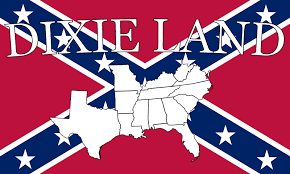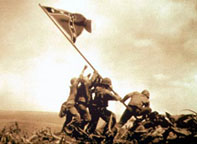In a dreary Yankee prison where a rebel soldier lay
By his side there stood a preacher ere his soul should pass away
And he faintly whispered parson, as he clutched him by the hand
Oh parson, tell me quickly, will my soul pass through the Southland?
Will my soul pass through the Southland, through Old Virginia grand?
Will I see the hills of Georgia, and the green fields of Alabam?
Will I see the little churchhouse, where I pledged my heart and hand?
Oh parson, tell me quickly, will my soul pass through the Southland?
Was for loving dear old Dixie, in this dreary cell I lie
Was for loving dear old Dixie, in this Northern State I die
Will you see my little daughter, will you make her understand?
Oh parson, tell me quickly, will my soul pass through the Southland?
Then the Rebel Soldier died.
This is a traditional Confederate song, adapted by an Irish Confederate solider held captive, perhaps at one of the Yankee Slaughter Houses that made Andersonville look like a summer resort.
Please note there isn’t one line about slavery.
The army didn’t fight for hate. They fought for love. And that their banner is shamed, is shame indeed.











Amen to that
Amen and amen.
The brave souls and bled and died, and were captured and died, those that lived physically on, but were as good a dead within, of the southern nation fought for their nation, their families, and their understanding of the will of God.
But never forgot, the men of the north fought just as much for their firm (if flawed) belief against slavery, for the preservation of the union, and for their understanding of the will of God.
Both were right. And both were wrong. While we can easily (and correctly) argue for 150+ years later, that the horrible war was never about slavery, many of the northern men (those that gave of themselves, not the sewage in DC that spent those men out so freely) truly believed they fought for the abolition of the satanic institution of american-style chattel slavery. For fighting for that belief, I honor them as well.
As there was also sewage in Richmond and elsewhere in the deep south that helped to foment that war that was opposed to abolition. So in some sense, that war was about it. But to the men taken from their families, and those that carried that war for the rest of their lives? That’s a different question.